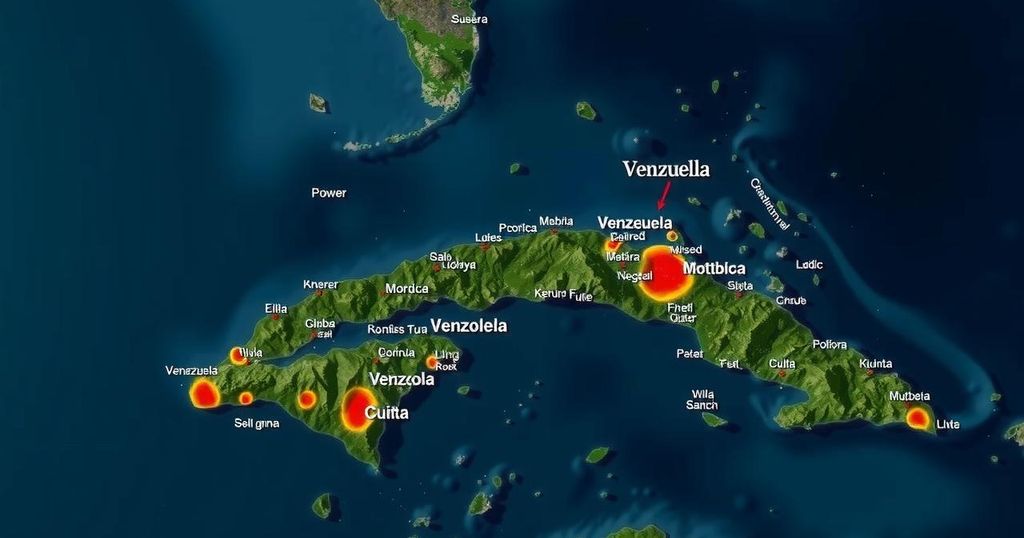Global news
ALEXEI ZHURAVLEV, CUBA, DEFENSE, DUMA, EUROPE/ASIA, HAVANA TIMES, KREMLIN, MILITARY, MILITARY SUPPORT, MOSCOW, NORTH AMERICA, PEACE NEGOTIATIONS, RUSSIA, RUSSIA-UKRAINE WAR, RUSSIAN DEFENSE COMMITTEE, SERGEI MIRONOV, SOUTH AMERICA, UNITED STATES, VENEZUELA, VLADIMIR PUTIN, WAR, WEST, ZHU
Isaac Bennett
0 Comments
Russia Considers Missile Deployment in Cuba and Venezuela: A Strategic Response to Western Military Support
Russian official Alexei Zhuravlev has suggested deploying missiles in Cuba and Venezuela in response to Western military support for Ukraine. This proposal, reminiscent of the Cold War era, reflects a strategic shift aimed at countering U.S. influence and asserting Russia’s commitment to its allies in Latin America. The conversation highlights the potential for escalating tensions and complex geopolitical implications as military alliances are revitalized.
In recent discussions, Russian legislator Alexei Zhuravlev has revived the contentious proposal for Russia to station missiles in Cuba and Venezuela as a strategic countermeasure to perceived Western aggression, particularly the assistance provided by the West to Ukraine. Zhuravlev articulated this plan as a necessary response that would signify Moscow’s willingness to defend its interests amidst ongoing hostilities, especially given the recent deployment of long-range tactical missiles by the United States to Ukraine. He emphasized that this escalation is warranted, asserting that such deployments would create a formidable deterrent against potential attacks from Ukraine’s allies.
Further amplifying these sentiments, Zhuravlev noted that similar military support should be extended to Cuba and Venezuela, equipping them with capabilities that could threaten U.S. territory directly. He argued that these nations should receive missiles comparable to those supplied by the U.S. to Poland, citing historical precedents from the Cold War era. This claim echoes previous assertions made by other Russian officials who have suggested militarizing these Latin American countries as a strategic response to American military actions abroad.
The conversation surrounding missile deployments is not entirely new, as Zhuravlev has reiterated these ideas in the past, aiming to evoke memories of the Cold War standoff. The recent military cooperation between Russia and Cuba has rekindled interest in military alliances reminiscent of the Soviet Union, reflecting a significant shift in geopolitical dynamics. Furthermore, the Kremlin has expanded military relations with Cuba, including the recent visit of a Russian naval flotilla that showcased various advanced missile systems in the Caribbean, heightening tensions and considerations for U.S. defense strategies.
As Venezuela and Cuba reinforce their military partnerships with Russia, the implications for regional stability and international relations remain complex. The interactions between these nations and the Kremlin are indicative of a broader geopolitical strategy responding to Western military support for Ukraine and the perceived threats to Russia’s sovereignty.
The discourse surrounding Russia’s potential deployment of missiles in Cuba and Venezuela is deeply rooted in the historical context of U.S.-Russia relations, particularly during the Cold War. The 1962 Cuban Missile Crisis serves as a primary reference point, marking a significant period of heightened tensions between the two superpowers. Since the onset of the conflict in Ukraine, Russian officials have increasingly sought to re-establish strategic alliances in Latin America, aiming to leverage geographical proximity to counterbalance U.S. military actions. This revival of military collaboration includes posturing by Russian legislators proposing missile installations in response to increasing Western support for Ukraine, underscoring the evolving landscape of international warfare and diplomacy.
In conclusion, the suggestion by Russian legislator Alexei Zhuravlev to install missiles in Cuba and Venezuela underscores significant geopolitical tensions exacerbated by the Ukraine conflict. This proposal reveals a strategic intention by Russia to counter U.S. influence in the region while attempting to regain the military foothold it once had during the Cold War. As both nations strengthen military collaborations with Russia, the resulting implications for regional security and international relations remain critical for stakeholders involved. The resurgence of historical alliances illustrates the complexity of current global dynamics as nations navigate a landscape marked by renewed rivalries.
Original Source: havanatimes.org




Post Comment